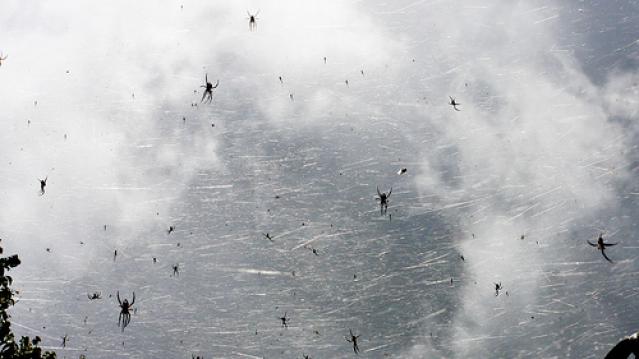‘Spider Rain’ as Millions of Baby Arachnids on Web Parachutes Fall from Sky

Imagine waking up to millions of baby spiders raining down from the heavens. It sounds like Charlotte’s Web meets Cloudy with a Chance of Meatballs – only a whole lot creepier.
Yet that’s exactly what happened in rural Golburn in the Southern Tablelands of New South Wales, Australia, according to The Sydney Morning Herald.
Ian Watson of Golburn told the paper that he looked up and saw a sky full of little black spiderlings and a tunnel of webs going up for hundreds of meters.
Related: The Five Most Dangerous States to Work In
An Australian naturalist said what’s called “ballooning” is a migration technique used by baby spiders, which climb up on a plant and release a streamer of silk web that is caught by the wind and carried away.
Martyn Robinson of the Australian Museum said the traveling spiders can go quite a distance, and that’s why there are spiders on every continent. They even land in Antarctica, he said, though they don’t last long.
Rick Vetter, an arachnologist, told the website LiveScience that "ballooning” is not unusual among certain types of spiders, but people just don’t notice it.
What is unusual, biology professor Todd Blackledge of the University of Akron in Ohio told LiveScience, is for millions of spiders to be blowing in the wind at the same time. He said the mass migration may have been caused by a sudden change in the weather that carried so many spiders aloft all at once.
The Washington Post says other incidents of so called spider rain have occurred recently in Texas, Brazil and another town in Australia.
Increasing Number of Americans Delay Medical Care Due to Cost: Gallup

From Gallup: “A record 25% of Americans say they or a family member put off treatment for a serious medical condition in the past year because of the cost, up from 19% a year ago and the highest in Gallup's trend. Another 8% said they or a family member put off treatment for a less serious condition, bringing the total percentage of households delaying care due to costs to 33%, tying the high from 2014.”

Number of the Day: $213 Million

That’s how much the private debt collection program at the IRS collected in the 2019 fiscal year. In the black for the second year in a row, the program cleared nearly $148 million after commissions and administrative costs.
The controversial program, which empowers private firms to go after delinquent taxpayers, began in 2004 and ran for five years before the IRS ended it following a review. It was restarted in 2015 and ran at a loss for the next two years.
Senate Finance Chairman Chuck Grassley (R-IA), who played a central role in establishing the program, said Monday that the net proceeds are currently being used to hire 200 special compliance personnel at the IRS.
US Deficit Up 12% to $342 Billion for First Two Months of Fiscal 2020: CBO

The federal budget deficit for October and November was $342 billion, up $36 billion or 12% from the same period last year, the Congressional Budget Office estimated on Monday. Revenues were up 3% while outlays rose by 6%, CBO said.
Hospitals Sue to Protect Secret Prices

As expected, groups representing hospitals sued the Trump administration Wednesday to stop a new regulation would require them to make public the prices for services they negotiate with insurers. Claiming the rule “is unlawful, several times over,” the industry groups, which include the American Hospital Association, say the rule violates their First Amendment rights, among other issues.
"The burden of compliance with the rule is enormous, and way out of line with any projected benefits associated with the rule," the suit says. In response, a spokesperson for the Department of Health and Human Services said that hospitals “should be ashamed that they aren’t willing to provide American patients the cost of a service before they purchase it.”
See the lawsuit here, or read more at The New York Times.
A Decline in Medicaid and CHIP Enrollment

Between December 2017 and July 2019, enrollment in Medicaid and the Children's Health Insurance Program (CHIP) fell by 1.9 million, or 2.6%. The Kaiser Family Foundation provided an analysis of that drop Monday, saying that while some of it was likely caused by enrollees finding jobs that offer private insurance, a significant portion is related to enrollees losing health insurance of any kind. “Experiences in some states suggest that some eligible people may be losing coverage due to barriers maintaining coverage associated with renewal processes and periodic eligibility checks,” Kaiser said.

